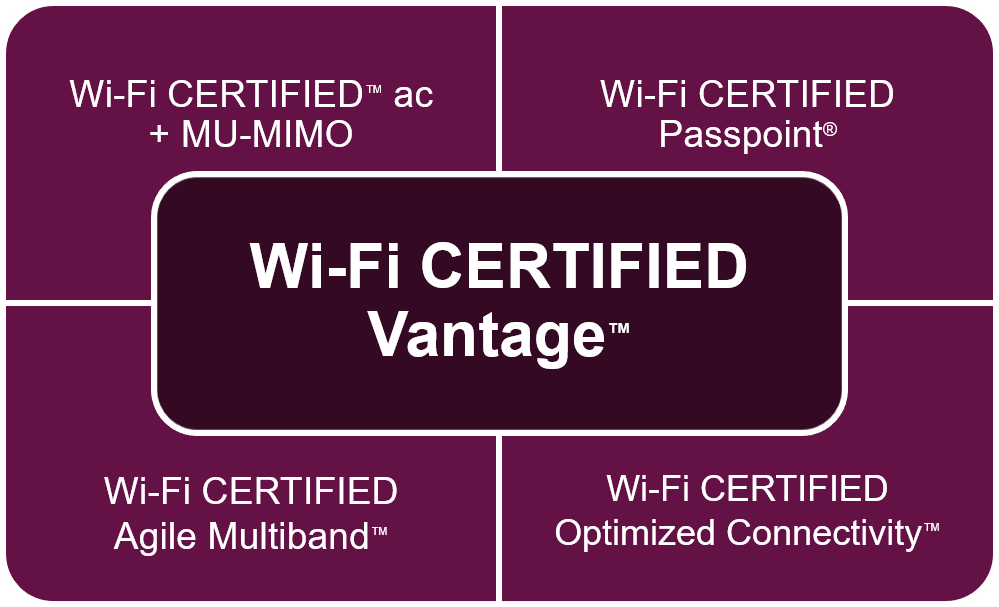Field trial results show Wi-Fi CERTIFIED Vantage™ devices offer significant improvement to network performance
This content was originally published on the CableLabs blog.
In a high traffic, high volume user environment such as subways, airports, and stadiums, maintaining a reliable connection and moving consistently across APs in a Wi-Fi® network has always been a challenge to users and operators. A solution to this issue is now commercially available in the form of Wi-Fi CERTIFIED Optimized Connectivity™ and Wi-Fi CERTIFIED Agile Multiband™ AP and STA devices. These are core certifications to the Wi-Fi Alliance® Wi-Fi CERTIFIED Vantage™ program. Wi-Fi Vantage™ devices contain features that optimize management and control frame transmissions, network discovery, authentication, and network transition. A field trial was conducted to measure the performance of a Wi-Fi network using Wi-Fi Optimized Connectivity™ and Wi-Fi Agile Multiband™ devices embedded in a highly congested urban environment centered around a busy subway station. Results show the following improvements over non-Wi-Fi Vantage devices:
 Optimized Network Discovery
Optimized Network Discovery
Without Wi-Fi Vantage, the inefficiencies of network discovery and response messages can severely disrupt existing client connections and make it difficult for clients to attach to the network. The optimized network discovery features in Wi‑Fi Vantage include suppression of, and broadcast of, probe responses by the AP and also include probe request deferral and suppression by the client. Field trial results show that the number of probe responses in a Wi-Fi Vantage network were reduced by 76% on the 2.4 GHz radios and by 72% on the 5 GHz radios. This resulted in a probe response airtime usage reduction of 67% in 2.4 GHz and 44% in 5 GHz.
Optimized Authentication
Without Wi-Fi Vantage, clients can experience long re-connection setup times when moving back into a previously-joined network. With Wi-Fi Vantage, this re-connection setup time is reduced using Fast Initial Link Setup (FILS) Authentication. FILS Authentication was tested in the Wi-Fi Vantage network. Results show the connection setup times decreased by 76% (from 228 ms to 55 ms).
Fast Network Transition
Without Fast Network Transition (FT), clients must perform a full Extensible Authentication Protocol (EAP) when roaming, possibly interrupting the end-user experience. With Wi-Fi Vantage, once a client device decides to roam to a different AP, band, or channel, the association and connection happen quickly and seamlessly. Test results show that FT roaming improved client re-connection setup times by 84%, reducing it from 203 ms to 31 ms. In addition, Fast Network Transition can be deployed with, and will work alongside, FILS Authentication to further optimize client connections and roams.
 A full-featured Wi-Fi Vantage network will provide benefit to overall network performance and user experience, especially in high traffic, high user environments. Some Wi-Fi Vantage features may already be included in operator-managed Wi-Fi networks using vendor-specific implementation and nomenclature. Field trial results will allow operators to assess the value of a partial- or full-featured, certified Wi-Fi Vantage network. CableLabs’ joint leadership with the operator community (cable and mobile operators) created the vision and roadmap for the Wi‑Fi Vantage program while partnering with the Wi-Fi ecosystem, and will continue these efforts for the next generation of Wi-Fi Vantage.
A full-featured Wi-Fi Vantage network will provide benefit to overall network performance and user experience, especially in high traffic, high user environments. Some Wi-Fi Vantage features may already be included in operator-managed Wi-Fi networks using vendor-specific implementation and nomenclature. Field trial results will allow operators to assess the value of a partial- or full-featured, certified Wi-Fi Vantage network. CableLabs’ joint leadership with the operator community (cable and mobile operators) created the vision and roadmap for the Wi‑Fi Vantage program while partnering with the Wi-Fi ecosystem, and will continue these efforts for the next generation of Wi-Fi Vantage.
You can find more information about Wi-Fi Vantage here. For more information about this project or CableLabs’ involvement please contact John Bahr (j.bahr@cablelabs.com) or Mark Poletti (m.poletti@cablelabs).
View the field study highlights
The statements and opinions by each Wi-Fi Alliance member and those providing comments are theirs alone, and do not reflect the opinions or views of Wi-Fi Alliance or any other member. Wi-Fi Alliance is not responsible for the accuracy of any of the information provided by any member in posting to or commenting on this blog. Concerns should be directed to info@wi-fi.org.
